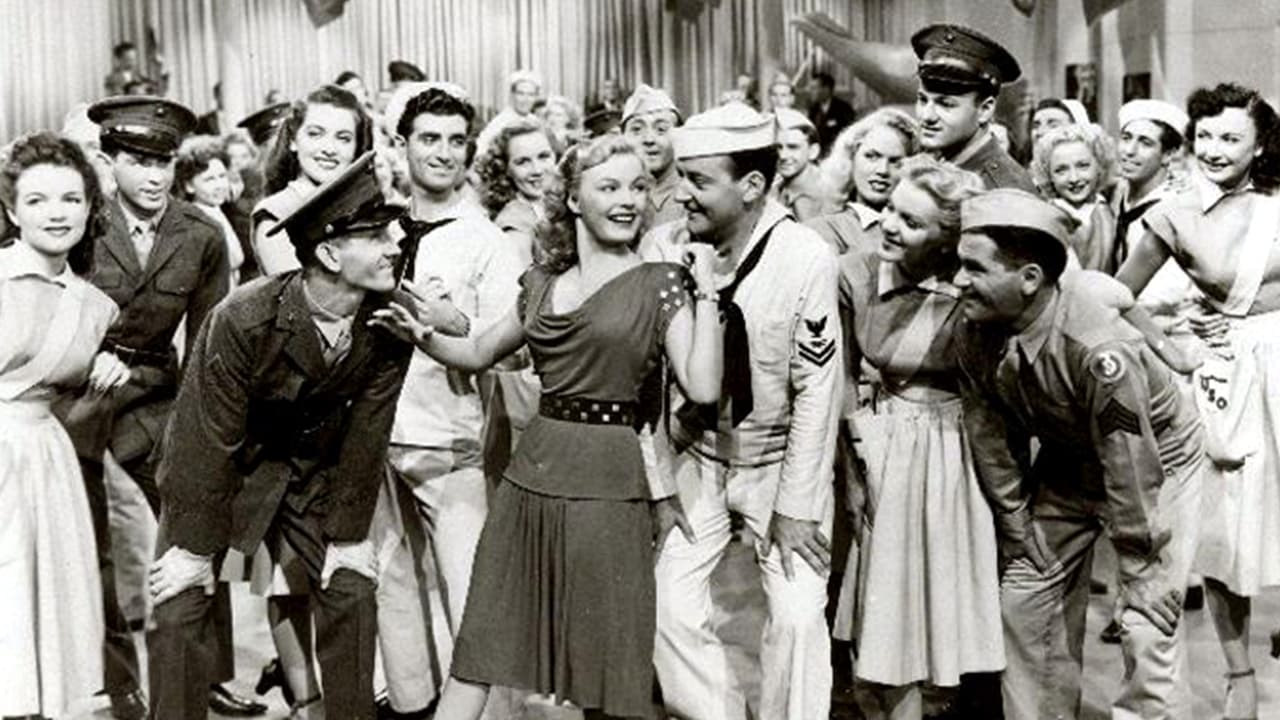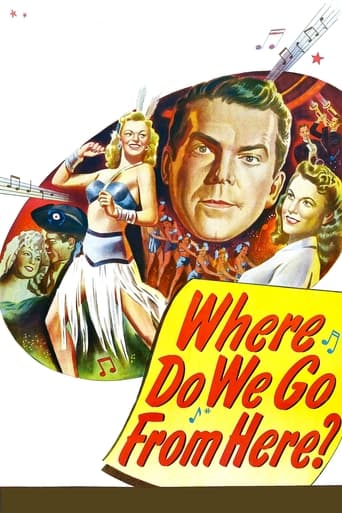

Surprisingly incoherent and boring
... View MoreIf you like to be scared, if you like to laugh, and if you like to learn a thing or two at the movies, this absolutely cannot be missed.
... View MoreVery good movie overall, highly recommended. Most of the negative reviews don't have any merit and are all pollitically based. Give this movie a chance at least, and it might give you a different perspective.
... View MoreActress is magnificent and exudes a hypnotic screen presence in this affecting drama.
... View MoreSaw it as many times as I could before it left the scene. A delightful and entertaining film with some of my very favorite stars. Only wish I could find it again! Would certainly buy/view it if I could. Please, somebody, bring it back. Fred MacMurray was perfect in his role as a patriot during World War II, and his leading ladies, Joan Leslie, and especially June Haver were beautiful and charming. It was a musical, but also romantic, funny, and clever. This was my favorite movie starring June Haver, although I always liked her. Her dazzling smile lit up the screen, and her beauty and talent were an asset to any film. The supporting cast lent credit to their individual roles. A well-balanced and light-hearted film; only wish we had more like it!
... View MoreFirst saw this half a lifetime ago on a black-and-white TV in a small Samoan village and thought it was hilarious. Now, having seen it for the second time, so much later, I don't find it hilarious. I don't find ANYTHING hilarious anymore. But this is a witty and light-hearted comedy that moves along quickly without stumbling and I thoroughly enjoyed it.It's 1945 and Fred MacMurray is a 4F who's dying to get into one of the armed forces. He rubs a lamp in the scrapyard he's managing and a genie appears to grant him a few wishes. (Ho hum, right? But though the introduction is no more than okay, the fantasies are pretty lively.) MacMurray tells the genie that he wants to be in the army. Poof, and he is marching along with Washington's soldiers into a particularly warm and inviting USO where June Haver and Joan Leslie are wearing lots of lace doilies or whatever they are, and lavender wigs. Washington sends MacMurray to spy on the enemy -- red-coating, German-speaking Hessians, not Brits. The Hessians are jammed into a Bierstube and singing a very amusing drinking song extolling the virtues of the Vaterland, "where the white wine is winier/ and the Rhine water's Rhinier/ and the bratwurst is mellower/ and the yellow hair is yellower/ and the Frauleins are jucier/ and the goose steps are goosier." Something like that. The characterizations are fabulous, as good as Sig Rumann's best. Otto Preminger is the suspicious and sinister Hessian general. "You know, Heidelberg, vee are 241 to 1 against you -- but vee are not afraid." I can't go on too long with these fantasies but they're all quite funny, and so are the lyrics. When he wishes he were in the Navy, MacMurray winds up with Columbus and the fantasy is presented as grand opera. "Don't you know that sailing west meant/ a terrifically expensive investment?/ And who do you suppose provides the means/ but Isabella, Queen of Queens." When they sight the New World, someone remarks that it looks great. "I don't care what it looks like," mutters Columbus, "but that place is going to be called Columbusland."Anyway, everything is finally straightened out, though the genie by this time is quite drunk, and MacMurray winds up in the Marine Corps with the right girl.I've made it sound too cute, maybe, but it IS cute. The kids will enjoy the puffs of smoke and the magic and the corny love story. The adults will get a kick out of the more challenging elements of the story (who are the Hessians?) unless they happen to be college graduates, in which case they might want to stick with the legerdemain and say, "Wow! Awesome!"
... View MoreWartime patriotism and escapism blend together in this amiable, but unspectacular musical. MacMurray is a towering, ostensibly-hearty man who is graded 4-F by the government and thus cannot enter the Armed Forces during WWII. He wants nothing more than to join up and beat the "Japs" (with the possible exception of wooing Leslie.) One evening, while helping an old woman with some scrap metal, he resurrects a genie who, in gratitude, grants him several wishes. His primary wish, to be in the service, sends him reeling back in time to the Revolutionary War, where he is serving under George Washington! This sort of thing continues as he finds himself on Columbus's flagship, on the island of Manhattan back when it was Indian territory and in Puritanical times. (Interestingly, the Civil War is left out.) In all the time frames, he sees various incarnations of the two ladies (Leslie and Haver) he has flirtations with in 1945. Finally, the genie assists him back to the 20th century where he hopes to somehow enlist in the Army. MacMurray is a friendly, easy-going presence and has a nice enough, if not amazing, singing voice. The ladies are attractive and sing well, but are not particularly distinctive. The best singing in the film comes from the rich-toned Ramirez who threatens mutiny on Columbus in a mini-operetta. The humor is light and simple-minded. The film never aspires to be anything other than morale-building froth, which is what the country needed at the time. Though most of the music is pretty enough and the costumes and sets are colorful, there isn't really anything overly memorable or striking about the film. Apart from the Columbus section, the only really zippy part is a number in a canteen with all the branches of service and Leslie daringly dancing on barstools. Still, it's an easy, appealing movie that has variety, if nothing else. MacMurray infiltrates a German beer hall (which is presented as rather charming in spite of the fact that the US was at war with Germany at the time!) and imitates Adolph Hitler at one point. Quinn shows up as a "Me Indian Chief" sort of Native American character (while Leslie dons what had to be an eye-opening, for 1945, two-piece costume.) The film has some fairly innovative opening credits and some fairly decent (for the time) special effects. Coincidentally, MacMurray later married Haver in real-life (after her short-lived stint in the convent) though here he is more after Leslie. Ironically, Haver and MacMurray adopted twins while Leslie had a set of her own naturally. One note: The first poster seems to have mistaken "uncredited" for "scenes deleted". While a section featuring Roy Rogers and Gabby Hayes was cut, that was basically it. Most of the performers listed after were just actors whose names failed to appear in the credits. They didn't have particular sequences that were cut.
... View MoreDuring a Kurt Weill celebration in Brooklyn, WHERE DO WE GO FROM HERE? was finally unearthed for a screening. It is amazing that a motion picture, from any era, that has Weill-Gershwin collaborations can possibly be missing from the screens. The score stands tall, and a CD of the material, with Gershwin and Weill, only underscores its merits, which are considerable. Yes, the film has its problems, but the score is not one of them. Ratoff is not in his element as the director of this musical fantasy, and Fred MacMurray cannot quite grasp the material. Then, too, the 'modern' segment is weakly written. BUT the fantasy elements carry the film to a high mark, as does the work of the two delightful leading ladies - Joan Leslie and June Haver. Both have the charm that this kind of work desperately needs to work. As a World War II salute to our country's history - albeit in a 'never was' framework, the film has its place in Hollywood musical history and should be available for all to see and to find its considerable merits.
... View More